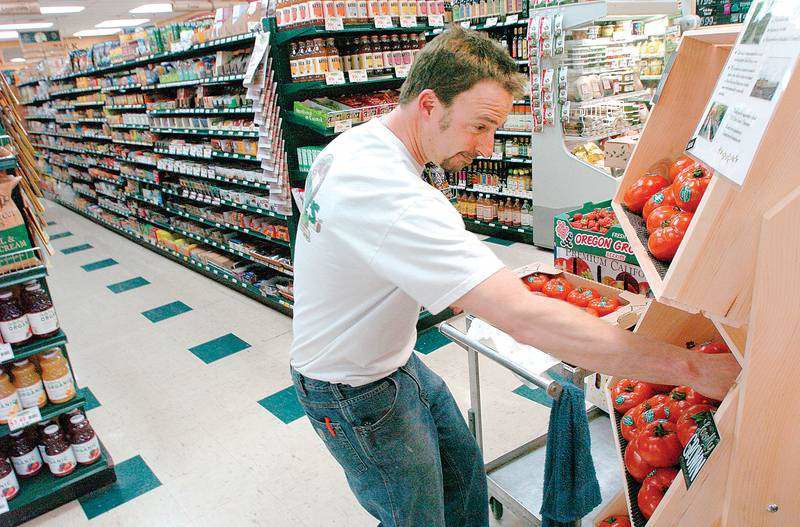Most play it safe, ditch suspect fruit
Published 5:00 am Wednesday, June 11, 2008

- Mike Ludmann, an employee at Nature’s General Store in Bend, on Tuesday stocks Greenhouse tomatoes grown by Country Vines in Madras. Locally grown tomatoes were not part of the FDA alert, but the store did have to discard a batch of gazpacho soup and its stock of Roma tomatoes.
After the Food and Drug Administration’s announcement Saturday that certain types of raw tomatoes may be linked to a national outbreak of salmonellosis, a fresh batch of gazpacho soup was one of the casualties at Nature’s General Store in Bend.
“It’s a bummer to a small business, but thank God we found out ahead of time,” said Nature’s owner Debbie Sloan, who also dumped the store’s stock of Roma tomatoes.
Sunriver Country Store manager Craig Moore tossed seven boxes of Roma tomatoes but had no problem doing it, he said.
“Customers understand. Who wants to take a chance?” Moore said.
Restaurants and businesses around Central Oregon were reacting this week to the FDA’s alert, which said raw red plum, Roma and round tomatoes should be avoided, depending on where in the country they were grown. The FDA suspects the tomatoes are linked to 167 reported cases of salmonellosis nationwide, 23 of which required hospitalization.
Three of the reported cases are in Oregon, involving residents of Umatilla, Union and Washington counties.
Locally grown tomatoes were not part of the alert.
Fresh products, such as salsa and guacamole, made with the affected tomatoes also should be avoided, according to the FDA.
Nationwide, a number of restaurant chains and grocery stores have pulled tomatoes from their menus or shelves in recent days, including McDonald’s, Burger King, Subway, Outback Steakhouse, Safeway and Kroger (parent of Fred Meyer), all of which have a presence in Central Oregon.
Jeff Duda, manager of Food 4 Less in Bend, said he dumped all of his store’s Roma tomatoes upon learning about the alert. Fortunately, Duda said he had already advertised and stocked up for a sale of on-the-vine tomatoes, which are considered safe and are not included in the alert. Other tomatoes deemed by the FDA to be safe are cherry, grape and homegrown tomatoes.
Duda said his store likely will not carry Romas until suppliers “get a handle on it.” The tricky part of the alert is finding out from where the tainted tomatoes may have come, Duda said. Once tomatoes leave the farm and enter the distribution chain, he said it can be hard to track their origin.
John Slivkoff, the manager of Ray’s Food Place in Bend, said some tomatoes have stickers of origin on them. However, to be safe, Slivkoff said he also dumped all of his store’s Roma tomatoes, even though he had a sale advertised for them. Going forward, Slivkoff said customers will know Ray’s Roma tomatoes are safe because they will only stock those grown in FDA-approved regions.
The FDA advises consumers to throw away any suspected tomatoes and does not recommend cleaning or cooking as ways to eliminate the bacterium.
At El Rodeo Mexican Restaurant in Bend, Luis Castellon said the staff is now making the restaurant’s salsa with canned tomatoes and is no longer including tomatoes in its dishes. Customers are noticing but are understanding, Castellon said.
“I think lots of people are aware of the issue,” he said, adding that customers aren’t complaining about the absence of tomatoes in entrees.
Pete Wodja, the owner of Little Pizza Paradise, hasn’t thrown out his Roma tomatoes — the FDA alert is short of a full recall — but is no longer serving fresh tomatoes on his pizza. Wodja said he’s waiting for his produce supplier to inform him about the status of his tomatoes before he throws them away. Wodja believes his tomatoes are safe, as they were grown in California, one of the regions with tomato crops that haven’t been traced to the salmonellosis outbreak.
Brad Parker, a spokesman with Food Services of America, which provides food to restaurants and institutions, said the company isolated its tomato inventory over the weekend and either returned affected tomatoes or destroyed them. Parker said that as new tomato crops are harvested from FDA-approved regions, the company is restocking its customers with tomatoes and expects them to be fully stocked by the end of the week.
Parker said it appears the FDA’s investigation is gaining speed, which is evidenced by its approval of more tomato-producing regions.
“That tells me they are narrowing the area they are looking at,” Parker said.






